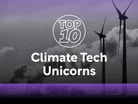Top 10: Climate Tech Unicorns

In response to the growing climate crisis, the push for sustainable technologies is more crucial than ever.
With climate change accelerating, companies worldwide are developing innovative solutions to reduce emissions and create more eco-friendly industries.
A new wave of climate tech unicorns — privately held companies valued at over US$1bn — are leading this charge. These firms are developing technologies that are revolutionising mobility, energy and sustainable products.
Here, we highlight the top 10 climate tech unicorns by value.
10. OLA Electric
OLA Electric is at the forefront of India’s electric mobility revolution. What began as a ride-hailing service has expanded into producing advanced electric vehicles, with a strong focus on cutting-edge battery technologies.
OLA Electric's innovations help reduce carbon emissions in the transport sector by replacing traditional internal combustion engine vehicles with electric options.
With research and development facilities across India, the UK and the US, the company is setting new standards for sustainable urban transportation and EV manufacturing.
9. Impossible Foods
Impossible Foods is reshaping the global food industry by reducing the environmental impact of animal agriculture.
By producing plant-based alternatives to meat, fish and dairy, Impossible Foods helps curb the greenhouse gas emissions associated with livestock farming. Their flagship product, the Impossible Burger, delivers the taste and texture of meat without the carbon footprint.
Through innovative food science, the company is working to create a more sustainable food system, addressing climate change by offering consumers eco-friendly alternatives.
8.SVOLT
SVOLT is a global leader in developing lithium-ion batteries for EVs, pushing the boundaries of battery technology to support the shift to electric mobility.
As a spin-off from Great Wall Motor, SVOLT focuses on improving the energy density and safety of EV batteries, which is critical for reducing emissions in the automotive sector.
By driving advancements in energy storage solutions, SVOLT is playing a key role in enabling widespread EV adoption, making clean transportation more accessible.
7. Octopus Energy
Octopus Energy is disrupting the traditional energy sector by offering customers renewable energy solutions through innovative technology. The company’s Kraken platform uses AI, machine learning and data analytics to optimise energy distribution and provide efficient, green energy at lower costs.
Octopus Energy serves more than 7.2 million customers and more than 40,000 business customers across 18 countries.
Octopus Energy also supports the EV revolution by offering leasing packages and home charging solutions, further pushing the transition to sustainable energy.
With its focus on renewables, Octopus is helping reduce reliance on fossil fuels and making clean energy more widespread.
6. Bolt
The first European mobility super-app, Bolt is transforming urban transportation by offering a range of eco-friendly services, including ride-hailing, shared cars, scooters and food delivery.
The company’s commitment to reducing the carbon footprint of urban mobility is reflected in its push to neutralise emissions across all services. By promoting shared mobility solutions and reducing dependency on private car ownership, Bolt helps cut down on greenhouse gas emissions in densely populated cities.
Today, Bolt has more than 150 million customers in over 45 countries.
5. Mahindra Electric Automobile Ltd (MEAL)
MEAL is pioneering the development of EVs in India, with a vision to lead the global market in sustainable mobility.
MEAL focuses on creating electric passenger vehicles that significantly reduce emissions in one of the world’s largest automotive markets. With strong backing from investors, the company is set to expand its EV offerings, contributing to the fight against climate change by reducing reliance on petrol and diesel vehicles.
Unveiling its Born Electric Vision in August 2022 and launching in India in 2023.
4. Northvolt
Northvolt is setting the benchmark for sustainable battery production with a mission to build the world’s greenest lithium-ion batteries.
Specialising in energy storage solutions for EVs and renewable energy grids, Northvolt’s production facilities operate with a focus on recycling and reducing carbon emissions.
Founded in 2015 by two former Tesla executives, it commissioned its first manufacturing plant in Sweden in 2021 and has announced plans for five others in Europe and North America.
By prioritising sustainable materials and minimising the environmental impact of battery manufacturing, Northvolt is helping accelerate the global shift to renewable energy and electric mobility, particularly in Europe.
3. GoodLeap
GoodLeap is revolutionising the financial sector by making it easier for homeowners to finance energy-efficient upgrades, such as solar panels and energy storage systems.
By providing affordable financing options, GoodLeap empowers consumers to transition to renewable energy and reduce their carbon footprints.
The company’s platform connects contractors and homeowners, streamlining the adoption of sustainable energy solutions. GoodLeap’s efforts contribute to the decarbonisation of residential energy use, supporting the global push toward cleaner, more sustainable homes.
2. GAC Aion
GAC Aion, a subsidiary of Guangzhou Automobile Group, is a prominent GAC Aion is a major player in the Chinese EV market, producing advanced EVs with a focus on sustainability, performance and cutting-edge design.
The company invests heavily in developing technologies like autonomous driving and smart connectivity, while maintaining a strong commitment to reducing its environmental impact.
GAC Aion's EVs are designed to meet the growing demand for clean transportation and its innovative approach to battery technology is helping lead China’s transition to a low-carbon future.
1. Cruise
Cruise is leading the autonomous vehicle revolution with a focus on reducing the environmental footprint of urban transportation.
By developing all-electric, self-driving cars, Cruise aims to lower greenhouse gas emissions and reduce congestion in cities. The company’s fleet of autonomous vehicles operates without human drivers, contributing to safer, more efficient transport systems.
With its commitment to sustainability, Cruise is redefining the future of mobility, making cities cleaner and more accessible while helping to combat climate change.
******
Receive the next edition of ClimateTech Magazine by signing up for its newsletter.
As part of this portfolio, make sure you check out Sustainability Magazine and also sign up to our global conference series - Sustainability LIVE.
Also check out our Sister Brand, Energy Digital.
******
ClimateTech Digital is a BizClik brand.
